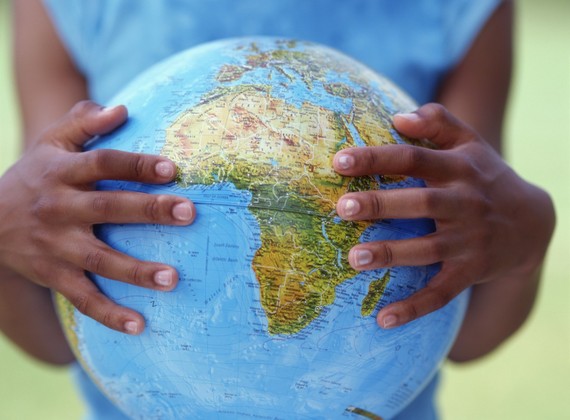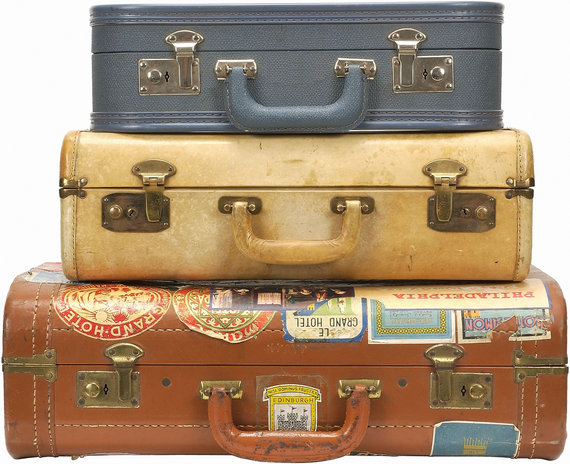I can't decide what confused me more, the sorbet that looked like a rock at Atera in New York, or the menu that combined labneh, sweet potatoes and kimchee at an East London supper club. Either way I am usually delighted by anything that blurs the boundaries between food, geographies, people, jobs, clothes, and the list goes on. Often, however, the practical realities and the theoretical meaning of this type of 'blurring' are often out of sync, especially when we think about blurring our own identities and the meaning of global citizenship.
The less defined things are, the cooler and more interesting they become
We're definitely seeing an upward trend in vagueness when it comes to where we shop, drink coffee or have our meal of the day, extending well into our identities. In this era of constant mobility and digital nomadism it is much easier to pull this off, and in fact, the more vague our identities the more appealing we become - including to ourselves. The concept of being a concept rather than a definitive 'thing' isn't new - heck Momofuku in New York demystified or mystified rather, the kitchen back in 2004. However, beyond being experimental in the kitchen, achieving and keeping global citizenship involves a bit more than plane hopping and being slightly confused when asked to fill in a mailing address on a form, despite the illusion of how easy it can be.
For instance, when thinking about a career move, it now increasingly involves a complete change of jobs, or geographic location, be it Singapore, Sydney or Los Angeles - it doesn't matter, job applications are a click away and our horizons have expanded enough to accommodate it. But does the fact that switching jobs and locations seem easy because of the ease by which we can apply online, actually reflect the reality behind moving? Well, not surprisingly, the digital and practical realities remain out of sync. To support such expansions in our horizons we're seeing housing and car solutions to suit this nomadism, and to a much lesser and slower extent health and banking systems with better global coverage and reduced international fees. Governments are slower on the uptake - while we are packing our bags quickly at a moment's notice, airport queues and visa processes remain a headache and often a big barrier to smooth mobility - even if blessed with a first world passport.

People prefer not to define themselves by one country - but how far do they truly identify with more than one?
Though previously reserved for gypsies or specific tribes, being a nomad in the 21st century is usually very well respected. Signifying a flexibility and worldliness that makes someone highly employable and interesting. Recently while having a coffee with friends one of them turned to me and said, ' so at the table we have an American, a Brit and a citizen of the world (referring to me).' Another friend, immediately reacted, a little taken aback by the apparent pigeon holing of his identity - 'well technically we are all citizens of the world.' He mustered. As if that badge of honour had somehow escaped him on that occasion. Perhaps that label is much more subjective than I thought. But is that really realistic? Is this push to loosen definitions and blur borders, sustainable, healthy and in keeping with human nature? And, I am sure that if pushed, that bias towards home countries (if you have one) would soon come out. For instance, I recently found out that I'd managed to offend a colleague of mine at work, for apparently being too brutal with my complaints about Germany's beurocracy. This came as a surprise to me as I could have sworn that this particular colleague was a pretty solid New Yorker. Or, ask the European Union, a few states could argue that it's currently a pain to be united.
So, the concept of world citizenship is very trendy and welcome, but in practice, it's trickier to adapt to.
What happens when you've paid taxes in 4 different countries, have ignored pension funds, rented all your life and have a bank account full of experiences rather than savings?
Is it satisfactory that at the age of 65 - that's all you have in the bank? And, now on top that you have no where to call home? If you asked your grandparents they'd probably be horrified, but ask your children and I am sure they'd find it appealing, or almost a right of passage.
One of the main issues today is that policies, frameworks and resources in place aren't necessarily supportive of this nomadic lifestyle. When moving from country to country we often need to set up new bank accounts, new health insurance schemes, wonder whether state pensions carry over and if so, how much of them do, find a new accountant to help navigate our new taxes, understand a new beaurocratic system and lifestyle, find and form new social networks, and the list continues. The more we blur the boundaries the more we have to play catch up with what that means in terms of services, logistics and financials. Eventually deconstructing what was once a set of tightly bound individual systems per country or state. The worrier in me cautions whether this movement towards nomadism is sustainable or simply allows us to at least continue this subjective definition of what it is to be a truly global citizen. Pushing all headaches associated with this title to the side, because for now it's trendy.
I guess either humanity will evolve towards global citizenship, painfully pulling all necessary logistics and systems with it, or perhaps this citizenship will be filtered out by a badly performing global system - a form of natural selection through globalization if you will.

